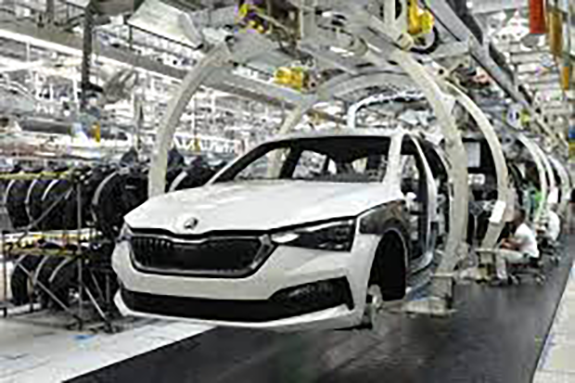Czech car production hits record high in 2024, despite decline in electric vehicle output
The Czech Republic’s automotive sector achieved a record high in 2024, with total vehicle production increasing by 3.9% year-on-year to 1.453 million vehicles, according to the Association of the Automotive Industry. Passenger car production reached 1.443 million units, reflecting a similar growth rate. However, the production of electric vehicles (EVs) and plug-in hybrids saw a significant 16% decline, totaling 151,162 units. Despite this drop, Czech automakers continued to export more than 93% of their output, with exports rising 4.5% compared to 2023.
Association president Martin Jahn emphasized the resilience of the Czech automotive industry, describing it as a crucial pillar of both the domestic and European economies. He warned, however, that growing regulatory pressure to increase the market share of electric vehicles comes at a time when consumer demand for EVs is waning. According to Jahn, European policymakers must reconsider emissions targets and avoid imposing fines that could undermine the global competitiveness of European manufacturers.
Among major automakers, Škoda Auto remained the dominant player, producing 896,933 cars in 2024, a 3.7% increase compared to the previous year. Electric vehicles accounted for 10.8% of Škoda’s output, with 79,932 battery-electric cars and 16,602 plug-in hybrids.
Meanwhile, Hyundai Motor Manufacturing Czech in Nošovice reported a 2.8% decrease in production, assembling 330,890 vehicles last year. Of these, 33,300 were fully electric, and 21,328 were plug-in hybrids, representing 16.5% of total production.
Toyota Motor Manufacturing Czech in Kolín achieved a strong performance, rolling out 225,058 vehicles, marking a 17% year-on-year increase. Nearly half of Toyota’s production comprised the hybrid Yaris HEV model.
Truck manufacturer Tatra Trucks experienced a slight increase in production, assembling 1,522 vehicles, up by 90 units year-on-year. The majority of Tatra’s production—nearly two-thirds—was destined for export markets.
The Czech bus manufacturing sector, however, faced a downturn, with production falling 14.5% to 4,489 units, primarily due to fluctuating orders. Iveco Czech Republic produced 4,040 buses, a 14.8% decline, with an additional 604 buses completed at its sister plant in Foggia, Italy. Meanwhile, the SOR plant in Libchavy assembled 416 buses, which was 76 fewer than in 2023. Minibus producer KHMC increased its output slightly, producing 31 vehicles, up by 11 units year-on-year.
Jawa Moto, the country’s leading motorcycle manufacturer, recorded a year-on-year increase of 154 motorcycles, with 52.6% of its production destined for foreign markets.
Despite the record-breaking total production figures, the decline in EV manufacturing highlights ongoing challenges in the transition to sustainable mobility. Industry leaders warn that policy adjustments will be needed to ensure continued growth and competitiveness amid evolving consumer preferences and regulatory landscapes.
The Association of the Automotive Industry remains optimistic about 2025, projecting stable demand for traditional vehicles while anticipating gradual adaptation to green technologies as market dynamics and government policies evolve.
Source: CTK









